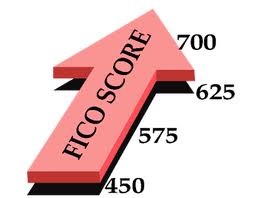 FICO scores, or credit scores, are a measure of your ability to pay back debt, or give the banks your money in the form of interest. You build these by going into debt, and then making your debt payments regularly and on time. Late payments and bankruptcy will negatively affect your FICO score. Yes, having a low credit score can cost you money, but only as long as you plan to stay in debt. A lower credit score will cause you to have a higher interest rate when you look to borrow money to buy a car or take out a mortgage for your house. As your credit score gets better, you can borrow money at lower interest rates or save money relative to having a low credit score.
FICO scores, or credit scores, are a measure of your ability to pay back debt, or give the banks your money in the form of interest. You build these by going into debt, and then making your debt payments regularly and on time. Late payments and bankruptcy will negatively affect your FICO score. Yes, having a low credit score can cost you money, but only as long as you plan to stay in debt. A lower credit score will cause you to have a higher interest rate when you look to borrow money to buy a car or take out a mortgage for your house. As your credit score gets better, you can borrow money at lower interest rates or save money relative to having a low credit score.
I have to give the banks credit here for coming up with a great money making idea. Think of people you know, who don’t have credit, who borrow money to buy a couch or TV they don’t need just to build credit. I know several people who have done this. Picking up on this idea, credit card companies, airlines, and all kinds of stores down to where I get my hair cut have started their own rewards programs where they hand out perks to customers for handing over their cash. Great idea!
Oddly enough, being debt free, not owing any money to anyone, will also bring down your credit score to effectively zero. That’s right, after six months, once you’re debt free, no credit card balances, no mortgage, no car payments etc. your credit score will go to zero. This does come with its own challenges, but they are few and far between, and can be easily avoided by paying cash for whatever it is you want to buy. One example of a challenge would be buying a house with a mortgage, a debt that I would say is semi-acceptable to have temporarily. You’ll have to find a bank that does manual in-house underwriting, and doesn’t act like every other big name bank by plugging your social security number into a computer to check your credit score to see whether you are approved. You’ll have to find a banker that has a functioning brain, which could be tough.
The new score that I’m proposing is called the PF Score, or Personal Finance Score. This is measured by taking your net worth and dividing it by your annual expenses. So if you have a net worth of $100,000 and your annual expenses are $25,000, your score is 4. Alternatively you can have a negative score if you have a negative net worth, when you owe more to others than the cumulative total of all your personal assets.
PF Score = Net Worth / Annual Spending
There are multiple ways you can improve your score. The first would be getting a higher paying job, which is easier said than done. Note that just getting a higher paying job won’t increase your score if your expenses creep up at the same rate. One approach would be to start lowering your expenses, maybe by switching from Whole Foods to a local discount grocer like Aldi. Get creative here; there are tons of frugal living blogs out there you can peruse for free ideas. This can be much easier than increasing your income. Another way would be by paying off your debt. This will help you out two-fold, your net worth will go up as you pay debt off, and your expenses will begin to lower as each debt falls off. Don’t forget to get your money working as hard as it can for you, with as few people as possible taking a bit off the top. To do this I recommend investing in index funds with ultra low expense ratios like you would find with Vanguard.
Scores:
<0 : You have a negative net worth and need to get out of debt NOW! Get a job if you don’t already have one, then get another one, and then a third for your weekends. Stop going out to eat, stop buying new toys, and don’t purchase any alcohol. You’re broke and can’t afford it. This would also be great time to quit smoking.
1: Nice Work! You’ve successfully saved up one year’s worth of expenses. Hopefully 25-50% of that is your emergency fund, hanging out in a high interest savings account, and the rest is working hard for you invested in funds with low expense ratios.
5: You’re starting to pick up steam, keep up the good work.
10: The ball is really rolling now. Your money is getting behind you every step of the way. Pat yourself on the back, and know that each new point will be coming faster through the magic of compound interest. This is the reason the rich get richer and the poor get poorer. The rich are earning interest and the poor are breaking their backs to pay interest on their debts.
 25: Congratulations, you are now financially independent! You can now withdraw 4% annually from your investment, without ever touching the principal, to cover all of your expenses. You no longer have to work for money. At this point you have some decisions to make. Do you want to continue working and raise your standard of living, do you want to start working for others by giving away 100% of your earnings? Maybe a mixture of both? It’s up to you. You could even take a year off to travel before coming back and decide then.
25: Congratulations, you are now financially independent! You can now withdraw 4% annually from your investment, without ever touching the principal, to cover all of your expenses. You no longer have to work for money. At this point you have some decisions to make. Do you want to continue working and raise your standard of living, do you want to start working for others by giving away 100% of your earnings? Maybe a mixture of both? It’s up to you. You could even take a year off to travel before coming back and decide then.
 30: Your investments are now out-earning your spending and continuing to grow. You could be building up a legacy to pass down to future generations. Maybe setting up college funds for every one of your grandchildren so your kids and their kids don’t have to worry about that huge expense. If you run out of kids and grand kids but still want to encourage education you could set up a scholarship fund through your local university, maybe consider this one. You could even start dressing like the monopoly man.
30: Your investments are now out-earning your spending and continuing to grow. You could be building up a legacy to pass down to future generations. Maybe setting up college funds for every one of your grandchildren so your kids and their kids don’t have to worry about that huge expense. If you run out of kids and grand kids but still want to encourage education you could set up a scholarship fund through your local university, maybe consider this one. You could even start dressing like the monopoly man.
And on: You are long past worrying about money. Eventually raising your lifestyle will reach a point of diminishing return, where each new shiny widget brings less and less utility and happiness. Start thinking about what you can do to make this world a better place for your family, your grandchildren, and those born without the same opportunities you were given. Think of Bill Gates as an example here. If you get bored and need a challenge, try racing him to be the first to find a vaccine for malaria, or invent a new toilet that doesn’t need water-exhaustive plumbing systems.
“In the long run you hit only what you aim at. Therefore, though you fail immediately, you had better aim at something high.”



Pingback: What’s Your PF Score? | Budgets Are Sexy
I’m in LOVE with your new scoring method!!! I found your site via J. Money’s site, BudgetsAreSexy.com. I’m so glad he promoted you because this is the best thing since Vanguard’s admiral shares funds!!!! You’ve come up with a simple method for gauging retirement readiness. You are brilliant!
Thanks Ree! The publicity I’ve received from J$ has been huge for me. I hope this helps you out and gives you one more metric to track progress towards your goal, that I’m sure you’ll be hitting sooner than later.
I’m just over an 18 by your scale…heading for 25 🙂
I want to use your model in a course I’m developing for a local adult education program. I’ll give you full credit and point people your way if you’re okay with me shouting out your awesome thinking! Let me know.
I’d be excited to contribute material for your class. Let me know if I can answer any other questions you have.
I need to calculate my score!
Once you calculate your score and establish your starting point you’ll be able to quickly start making progress by focusing on increasing your savings / investments and decreasing your expenses.
Pingback: What’s your Personal Finance (PF) score and how do you calculate it?
Good stuff dude! I’m picking up steam. Thanks for coming up with this cool model!
Great work Joel! You’ll be there in no time.
Thanks for sharing the PF scoring model. An absolute eye-opener! Thinking of sharing this wonderful scoring model in a future blog post at my website at KelvinWong.com but will include a link back to this original article if you are okay with it. Thanks again!
Kelvin, thank you for your kind thoughts. I’d be honored to have you share this idea on your site.
The pleasure is mine, Joshua! I have already written an article titled “Assess Your Financial Health Using the Personal Finance Score” with a link back to this original article. You can check it out at http://www.kelvinwong.com/3/post/2014/03/assess-your-financial-health-using-the-personal-finance-score.html.
Pingback: February 2014 Debt Update | jlyblog
Pingback: The PF Score | Canadian Dream: Free at 45
Loved reading this post!
The only number I know is my NW…and now the multiplier to FI. I have no hot clue what my FICO score is and don’t care!
Banks and financial institutions are not our friends. The sooner I learned this, the sooner my happiness increased significantly.
Thanks F2P for the kind words. It sounds like you are well on your way!
Pingback: Wie weit bist du auf dem Weg zur finanziellen Freiheit? | smart-reich-werden.de
Pingback: Personal Finance Score | Financially Katie
Hi Katie. I wrote that post a few years ago when I too was learning about the four percent rule. I started learning about personal finance through Dave Ramsey, and he always said your FICO score was an I Love Debt Score. I agreed, and came up with my own scoring system to incentivise people to get out of debt and also save and invest for their financial independence at the same time. Once challenge I’ve had in making progress towards that magical score of 25 is my expenses growing over time. My wife and I make good money now, but we plan to have kids in the future and also she may change jobs for something that pays a little bit less. It can at times feel like the goal is getting further away, but I try to be like the tortoise consistently making progress towards a common goal, rather than the hare continuously moving the goal. Cudos to you for taking steps towards your goals. You’re already way ahead of me when I was your age.
Thanks for this model. I have a few questions…
1. Should you really include your primary residence in this calculation? My concern would be that you cannot “spend your house” (reverse mortgage being the exception).
2. For expenses should you include gross expenses (i.e. factoring in taxes)?
If you consider these two variables in the model you end up with significantly different scores and not considering these in your calculation could result in having to sell primary residence to fund retirement and / or running out of money.
I appreciate your thoughts on this matter.
Hello Don, Thank you for your comments. You are correct in that these two variables can skew the scores significantly and I should have better clarified in the original post.
1. Regarding your primary residence being included in the calculation. I had to think about this for a minute. If your house is paid off, and is a large portion of your net worth then I would not suggest including it. As you said, you cannot spend you house. Some do spend their house by taking out reverse mortgages, or second mortgages, but I would not advise this.
2. Taxes are another important wrinkle that needs ironing out. If you have the bulk of your net worth in Roth IRA’s and Roth 401k’s they are less of an issue. However if your assets are in taxable accounts subject to long term capital gains taxes or tax deferred type accounts you should include income taxes in the equation. For example when calculating the amount needed to meet expenses, add the amount of income taxes you’ll have to pay as you withdraw funds from your accounts to pay those expenses.
Pingback: Wie weit bist du auf dem Weg zur finanziellen Freiheit? | Mission Rendite